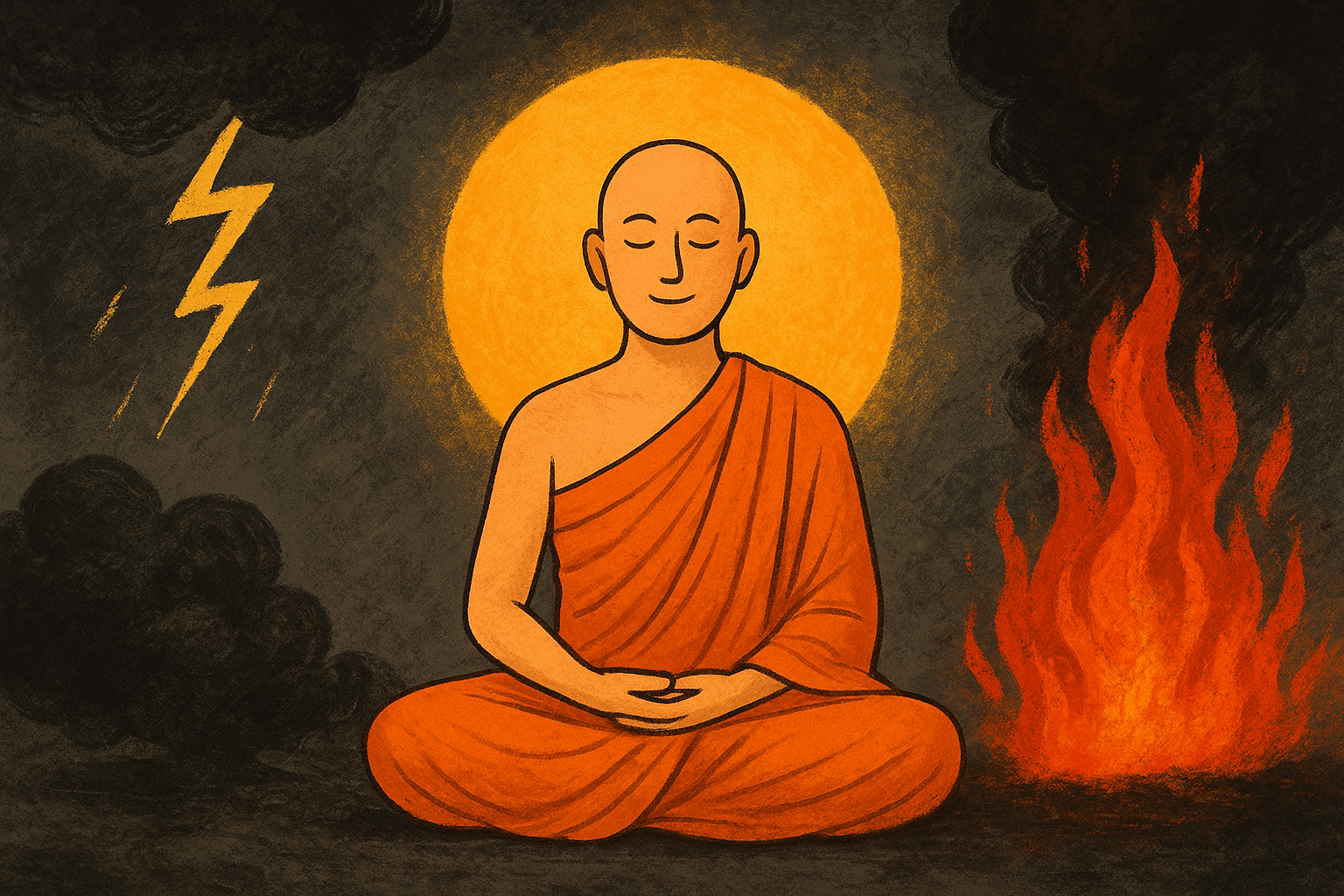Happiness
Many spiritual masters have long
emphasized a simple yet profound truth: “If someone is not happy wherever he
is, he cannot be happy anywhere else.”
As always, this concept is also susceptible to
misunderstanding and misinterpretation. At first glance, it may appear to
suggest that no matter what happens, one should simply learn to be happy. But
the real meaning lies far deeper—it points not to blind acceptance of
suffering, but to the discovery of a happiness that no outer situation can
disturb.
Such distortion occurs when we interpret spiritual
teachings through a purely literal or unawaken mind. This is why only an
awakened being can truly interpret the words of another awakened one.
The Story of Ananda
I always liked a Buddhist story that
beautifully illustrates this. Ananda was the closest disciple of Buddha. For
forty years, he remained with Buddha like a shadow. After Buddha passed away,
Buddhists started collecting his teachings, and Ananda was the only person who
had heard them all. So, they went to him and requested that he share Buddha's
teachings.
Ananda gave them the words of Buddha,
but before every sentence, he added a prefix: “As I heard from Buddha.” He
never said, “As Buddha told…” or “Buddha meant to say that….”
This shows the honesty of Ananda. He
was in such an authoritative position that whatever he said would have been
taken as truth, yet he didn’t misuse that authority. When he said, “As I heard
from Buddha,” he was acknowledging, “How could I know what Buddha meant to say?
Only Buddha can know what he meant. I can only tell you what I heard and
understood.
To understand or interpret any concept of the highest
level, one must also have a consciousness of the highest level.
Inner Vs Outer Happiness
Most spiritual concepts concern inner growth and the
soul’s evolution. They must be applied inwardly—toward self-awareness—rather
than outwardly, toward external circumstances. Yet, because most of us live
outwardly, this mistake of projection is bound to happen. That’s why it is
important to find the right person who can bring the right meaning to light.
As I understand this concept - “If someone is not happy wherever he is, he cannot be happy anywhere else”—it speaks of inner peace, inner contentment, and inner happiness. Someone who has reached this state of inner happiness will not be disturbed by outer circumstances. You may put garlands on him or handcuffs; praise him or curse him—it will make no difference. He will remain as he is: silent and smiling.
But because most of us know only happiness derived
from external circumstances, we easily misunderstand this concept. In the
higher interpretation, the person is already happy within, and outer situations
have no power to affect that state. In the lower interpretation, the person is
unhappy and seeks happiness through outer situations.
This concept can also be understood through Jesus’s
words: “Seek ye first the Kingdom of God, and all these things shall be added
unto you.” (Matthew 6:33)
Once we find inner happiness and contentment, whatever
is meant to happen in outer life will happen naturally. A person who is aware
will take decisions in alignment with inner peace. If an association disturbs
that peace, they will walk away without hesitation. But if one has not yet
found that inner happiness, no change of place or partner will make a
difference
As Osho says,
“If you are
miserable in Poona, you will be miserable in New York. If you are blissful in
Poona, you will be blissful in New York. Because misery and bliss are not
geographical — they are psychological.”
Conscious vs. Unconscious Living
An unconscious person escapes situation without
awareness. For example, a man unhappy in his marriage blames his partner and
leaves her, only to repeat the same misery with another partner. He escaped one
form of suffering, only to recreate it again—because he never faced the real
cause, his own mind.
A conscious person, however, observes themselves
deeply. They see how dependency, fear, or past wounds shape their reactions.
When awareness arises, they may realize: “This relationship is abusive. Staying
here blocks my growth.” So, they leave—not in anger, but with clarity. Their
decision comes from awareness, not escape. As a result, peace follows, not
regret.
Thus, this whole concept is about going inward to seek
inner contentment and happiness first. Once we have that, our awareness
naturally guides us toward people and situations that support our joy—and away
from those that don’t.
If someone continues to stay with people or in
situations that bring only misery, it means they still don’t know inner
happiness and believe happiness lies outside. In no way does this concept
suggest enduring abuse, crime, or manipulation. Spirituality is about bliss,
not suffering.
As Osho says again,
“To be spiritual
is to be intelligent with awareness. If someone slaps you and you just stand
there saying, ‘I am happy, I am divine,’ then you are not divine — you are just
stupid.”
If someone is caught in a situation of abuse or
manipulation, it is their duty to get out through awareness and right action.
The difference is that an awakened person leaves without hatred—only with
compassion toward the abuser.
This is my understanding of this concept that it is to
seek inner contentment and inner happiness and then you will automatically
attract happiness from all sides. Conversely, if you don’t have that inner
happiness then you will automatically create disasters wherever you go.
Misunderstood Concepts
Following are some other spiritual concepts which are
similarly misunderstood or misinterpreted by us –
Apocalypse – “Apocalypse
is a word that means "the end of the world" — or something so
destructive it seems like the world has ended, like the event of a major earthquake.
The apocalypse is the total destruction of the world, as prophesied in the
Biblical book of Revelation.“
My understanding – For every individual, there is a
separate world. As world’s population is 8 Billion right now, it means that
there are at least 8 Billion ways of looking at this world or we can even say
that there are 8 Billion Worlds within this one world. For every individual,
there is a separate individual world.
Apocalypse is commonly seen as the end of the world,
but in truth, it symbolizes the end of an individual’s old world—the
destruction of the egoic mind and birth of new vision. It is an inner
transformation, like a kundalini awakening or out-of-body experience that
changes one’s perception entirely.
I won’t interpret Apocalypse as the end of the whole
world but as the end of an individual’s world and shift in outlook of that
individual; from very mundane to very mystical or paradoxical.
Doomsday Prophecy – “In many religions, doomsday is
the end of the world and the moment of final judgment. Doomsday means utter
catastrophe, in both religious and secular contexts”
My understanding – Again as I understand, world here
means the individual world – one for every individual. Doomsday represents not
global destruction but the death of the individual world at the time of one’s
death.
Final judgment can be understood as the analysis of
karma from this life and all accumulated karma from many lives on which basis
individual gets next life to learn his further lessons and live his karma. So,
I would understand doomsday philosophy as the time of death and re-birth based
on all accumulated karma.
Heaven & Hell – As Osho says, they are not geographical places but states of mind. Whenever you are happy, you are in Heaven; when you are miserable, you are in Hell.
Holy War or Jihad - "Holy war" is a Western
concept referring to war that is fought for religion, against adherents of
other religions, often in order to promote religion through conversion, and
with no specific geographic limitation.
My understanding – Rumi says –
“O kings, we
have slain the outward enemy,
but there remains within us a worse
enemy.
To slay this one is not the work of
reason or wit —
the true lion is he who slays himself.
He who conquers his own self is the
lion indeed,
not he who conquers other men.
O my beloved friends, this tale is
true and fine:
the war with the self is the greatest
holy war.”
Rumi draws on the Prophet’s saying: “We return from
the lesser jihad to the greater jihad—the struggle against the self.”
For Rumi, the “outward war” symbolizes
our efforts to reform the world, while the “inward war” is the real
transformation — conquering greed, pride, and desire.
The real hero is one who defeats his
own ego, not one who triumphs over others.
I think it is very clear from the poem and
interpretation that the real Holy War is the inner one, fought against ego,
greed, and pride. All outer wars are unholy.
Conclusion
Seek the higher meanings in spiritual texts. Leave
interpretation to the awakened, for only they can read from the depth of
awareness. And how to recognize the awakened? Through their interpretations—the
deeper the meaning they reveal, the higher their evolution.
Ultimately, spiritual understanding is not about
acquiring knowledge but about awakening perception—seeing the same words
through the eyes of truth.
Gratitude!!!



Leave a Reply